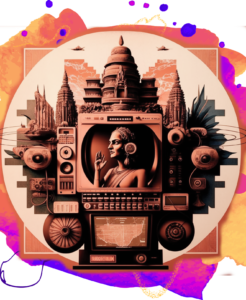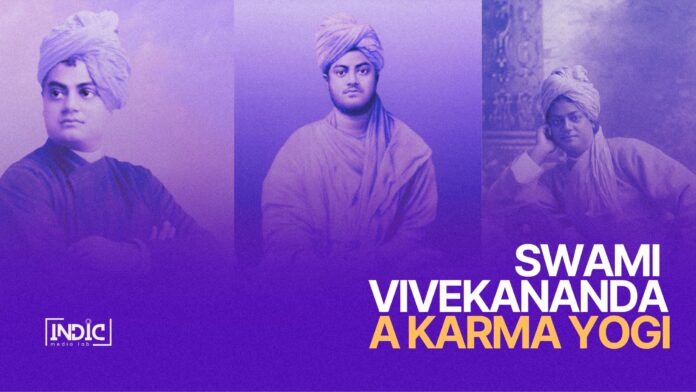Who is a Karma Yogi?
A young Sannyâsin went to a forest; there he meditated, worshipped, and practiced Yoga for a long time. After years of hard work and practice, he was one day sitting under a tree, when some dry leaves fell upon his head. He looked up and saw a crow and a crane fighting on the top of the tree, which made him very angry. He said, “What! Dare you to throw these dry leaves upon my head!” As with these words he angrily glanced at them, a flash of fire went out of his head — such was the Yogi’s power — and burnt the birds to ashes. He was very glad, almost overjoyed at this development of power — he could burn the crow and the crane with a look.
After a time he had to go to the town to beg his bread. He went, stood at a door, and said, “Mother, give me food.” A voice came from inside the house, “Wait a little, my son.” The young man thought, “You wretched woman, how dare you make me wait! You do not know my power yet.” While he was thinking thus the voice came again: “Boy, don’t be thinking too much of yourself. Here is neither crow nor crane.” He was astonished; still, he had to wait.
At last the woman came, and he fell at her feet and said, “Mother, how did you know that?” She said, “My boy, I do not know your Yoga or your practices. I am a common everyday woman. I made you wait because my husband is ill, and I was nursing him. All my life I have struggled to do my duty. When I was unmarried, I did my duty to my parents; now that I am married, I do my duty to my husband; that is all the Yoga I practice. But by doing my duty I have become illumined; thus I could read your thoughts and know what you had done in the forest. If you want to know something higher than this, go to the market of such and such a town where you will find a Vyâdha (The lowest class of people in India who used to live as hunters and butchers.) who will tell you something that you will be very glad to learn.”
The Sannyasin thought, “Why should I go to that town and to a Vyadha?” But after what he had seen, his mind opened a little, so he went.
When he came near the town, he found the market and there saw, at a distance, a big fat Vyadha cutting meat with big knives, talking and bargaining with different people. The young man said, “Lord help me! Is this the man from whom I am going to learn? He is the incarnation of a demon, if he is anything.” In the meantime this man looked up and said, “O Swami, did that lady send you here? Take a seat until I have done my business.” The Sannyasin thought, “What comes to me here?” He took his seat; the man went on with his work, and after he had finished he took his money and said to the Sannyasin, “Come sir, come to my home.”
On reaching home the Vyadha gave him a seat, saying, “Wait here,” and went into the house. He then washed his old father and mother, fed them, and did all he could to please them, after which he came to the Sannyasin and said, “Now, sir, you have come here to see me; what can I do for you?” The Sannyasin asked him a few questions about soul and about God, and the Vyadha gave him a lecture which forms a part of the Mahâbhârata, called the Vyâdha-Gitâ. It contains one of the highest flights of the Vedanta. When the Vyadha finished his teaching, the Sannyasin felt astonished. He said, “Why are you in that body? With such knowledge as yours why are you in a Vyadha’s body, and doing such filthy, ugly work?” “My son,” replied the Vyadha, “no duty is ugly, no duty is impure. My birth placed me in these circumstances and environments. In my boyhood I learnt the trade; I am unattached, and I try to do my duty well. I try to do my duty as a householder, and I try to do all I can to make my father and mother happy. I neither know your Yoga, nor have I become a Sannyasin, nor did I go out of the world into a forest; nevertheless, all that you have heard and seen has come to me through the unattached doing of the duty which belongs to my position.”
This story is fetched from the Complete Works of Swami Vivekananda, Volume 1: KarmaYoga, Chapter IV.
Why Swami Vivekananda is considered an embodiment of Karma Yogi?

As we all know, today is the birthday of Swami Vivekananda, the Karma Yogi of Bharata. Who had a great vision for this nation. He is the embodiment of Karma Yogis Svadharma. He was a key figure in the introduction of Indian philosophies of Vedanta and Yoga to the Western world. He is best known for his powerful speeches at the World’s Parliament of Religions in Chicago in 1893. Vivekananda dedicated his life to the upliftment of humanity, and his adherence to his svadharma (one’s own duty or righteous path) played a crucial role in shaping his life.
Here are some aspects of how Swami Vivekananda followed his Svadharma:
Spiritual Quest
From a young age, Vivekananda showed a keen interest in spirituality and the search for the ultimate truth. His quest for spiritual knowledge led him to the teachings of his guru, Sri Ramakrishna Paramahamsa. Vivekananda devoted himself to spiritual practices and the pursuit of knowledge in accordance with his inner calling.
Service to Guru
Swami Vivekananda’s svadharma involved serving his guru, Sri Ramakrishna. After the passing of his guru, Vivekananda took the responsibility of spreading Sri Ramakrishna’s teachings and ideals. He considered this mission as his sacred duty and worked tirelessly to fulfill it.
World Outreach
One of the significant aspects of Vivekananda’s svadharma was his mission to share the spiritual wisdom of India with the world. At the World’s Parliament of Religions in Chicago in 1893, he delivered his famous speech, promoting religious tolerance and the universality of all religions. This marked the beginning of his global mission to spread the message of Vedanta and the spiritual heritage of India.
Service to Humanity
Vivekananda believed in the divinity of every soul and saw service to humanity as a manifestation of one’s devotion to God. He founded the Ramakrishna Math and Mission, organizations dedicated to selfless service, education, and spiritual upliftment. The svadharma of serving humanity became a central theme in his life and teachings.
Self-discipline and Character Building
Swami Vivekananda emphasized the importance of self-discipline, character building, and the development of inner strength. He practiced what he preached, leading a disciplined and austere life that reflected his commitment to his spiritual ideals.
Fearlessness and Courage
Vivekananda’s svadharma also involved fearlessness and courage. He encouraged individuals to face challenges with a brave heart and to overcome obstacles on the path to self-realization.
Swami Vivekananda’s life was a manifestation of his adherence to his svadharma, which included spiritual exploration, service to his guru, dissemination of spiritual knowledge globally, selfless service to humanity, and the embodiment of virtues such as discipline and courage. His teachings continue to inspire people worldwide to lead purposeful and meaningful lives.


